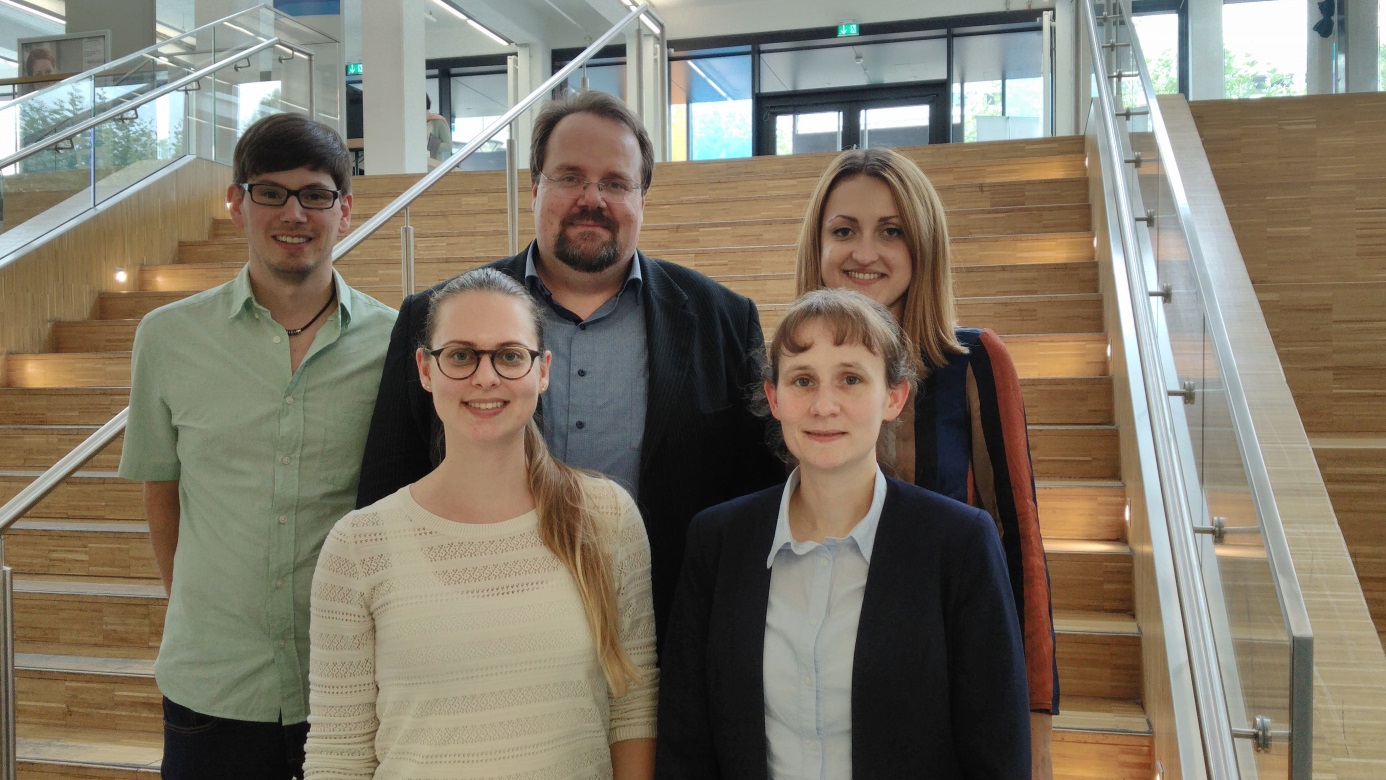Meet the Researchers from Aachen
Since autumn 2015, the Institute of Biotechnology led by Prof Ulrich Schwaneberg at the RWTH Aachen University is hosting four researchers in the ROBOX – H2020 project, Anna Joëlle Ruff, Anna Gärtner, Alexandra Weingartner and Alan Mertens.

The RWTH ROBOX team; From left to right: Dr. Alan Mertens, Prof. Ulrich Schwaneberg, Anna Gärtner, Alexandra Weingartner, Dr. Anna Joëlle Ruff.
The RWTH Aachen University located in the historical city of Aachen (North-Rhine Westphalia, Germany) at the tripoint of Belgium, Germany and the Netherlands, was founded as a University and technology institute as early as 1870. With its 260 institutes in nine faculties, RWTH Aachen is among the leading European scientific and research institutions and selected as one of the 11 most influential universities of the country by the German government. The RWTH caters for 42,298 students in 144 courses of study are registered, including 7,056 international students from more than 120 countries. Teaching at RWTH Aachen is first and foremost application-oriented.
Within the faculty of Mathematics, Computer Science and Natural Sciences, the ABBt (Aachen Biology and Biotechnology) focuses on three research areas: (a) biobased molecules and materials, (b) plant protection and (c) neurobiology. The Institute of Biotechnology at RWTH Aachen University is part of ABBt and headed by Prof. Dr. Ulrich Schwaneberg, who is also co-appointed at the DWI-Leibniz Institute for Interactive Materials. Furthermore he is an executive managing director in the Bioeconomy Science Center (BioSc) which deals with expertise, technologies and training for a sustainable bioeconomy. Since 2014, he has a visiting professorship of Senior International Scientists from Chinese Academy of Science and is a specially appointed professor of Osaka University.
The Schwaneberg group’s core competence is the rational and evolution design of proteins. The institute is divided in divisions focusing on directed evolution and diversity generation, high throughput screening, understanding of structure-function relationships and bio-hybrid systems. Projects range from fundamental science to understand the structure-function relationships by protein modeling to methods development for directed evolution and optimization of biocatalysts for sustainable production from renewable resources. In addition, within the DWI-Leibniz Institute for Interactive Materials triggerable proteins are designed for generating bio-hybrid materials. Within the research field of protein engineering and biocatalysis more than 13 patents (primarily with industrial partners (BASF, DSM, Evonik, Roche, Henkel, BRAIN) have been filed and more than 140 publications have been published. Methodological highlights comprise random mutagenesis methods like SeSaM to improve biocatalyst properties which are rationally not understood (e.g. solvent and pH stability), and OmniChange (simultaneous site-saturation of up to 5 codons) to address “focused” properties in enzymes (e.g. activity, selectivity and substrate specificity). Within ROBOX, our expertise is offered, amongst other by providing OmniChange libraries to ROBOX partners.
Anna Joëlle Ruff conducted her PhD thesis entitled “Advances in directed monooxygenase evolution: From diversity generation and flow cytometry screening to tailor-made monooxygenases.” at the RWTH Aachen University from 2009 to 2012 within the EU-Project Oxygreen. Before that, Anna Joelle completed her Diploma (M.Sc. equivalent) in biology at the RWTH Aachen University. Her work was focusing on microbiology and industrial biotechnology. Since 2012, she is division head for molecular biology in the group of Prof. Schwaneberg, guiding a research group of up to 11 people and involved in teaching as well as funding acquirement. She is working with monooxygenases for almost 8 years now, and project leader within ROBOX since the start of this project. Within ROBOX, Anna Joelle is responsible for the project management at the RWTH Aachen and also actively supports her team in the library generation, P450 assay development and P450 BM3 engineering.
Anna Gärtner is PhD student within ROBOX at the RWTH Aachen. She holds a M.Sc. in biotechnology and a B.Sc. in chemistry from Westphalinen Wilhelms University Münster. Anna completed her master thesis which focused on the topic of chitinase characterization from soil metagenomes in 2014. She is trained in the field of molecular biology and enzymology. Anna`s tasks within ROBOX involve the investigation of hydroxylation of olefins through directed evolution of P450 BM3. Bioconversions allow Anna to quantify the product formation and rank the performance of the generated variants. She is also working on the development of product specific high throughput screening assays.
Alexandra Weingartner originating from Austria is working as well as PhD student within ROBOX at the RWTH Aachen University. She graduated in 2015 from Graz University, with a M.Sc. in biochemistry. Her master thesis focused on the engineering of aminoacyl-tRNA synthetases which provided Alexandra with skills in rational protein design and directed evolution. Her PhD topic, within ROBOX is the directed evolution of P450 BM3 for aromatic hydroxylation. She is developing screening assays for detection of hydroxylated aromatics, generating and screening mutagenesis libraries as well as analyzing the performance of the selected variants in enzymatic conversions through product isolation, identification and quantification.
Alan Mertens joined the ROBOX project recently in 2017. He conducted his PhD at the RWTH Aachen University to. As Post-Doc, he is within the institute responsible for the strategic development and supports the OmniChange technology development.
Acknowledgement: This work is part of the ROBOX project. The ROBOX project has received funding from the European Union (EU) project ROBOX (grant agreement n°635734) under EU’s Horizon 2020 Programme Research and Innovation actions H2020-LEIT BIO-2014-1. Any statements made herein reflect only the author’s views. The European Union is not liable for any use that may be made of the information contained herein.
